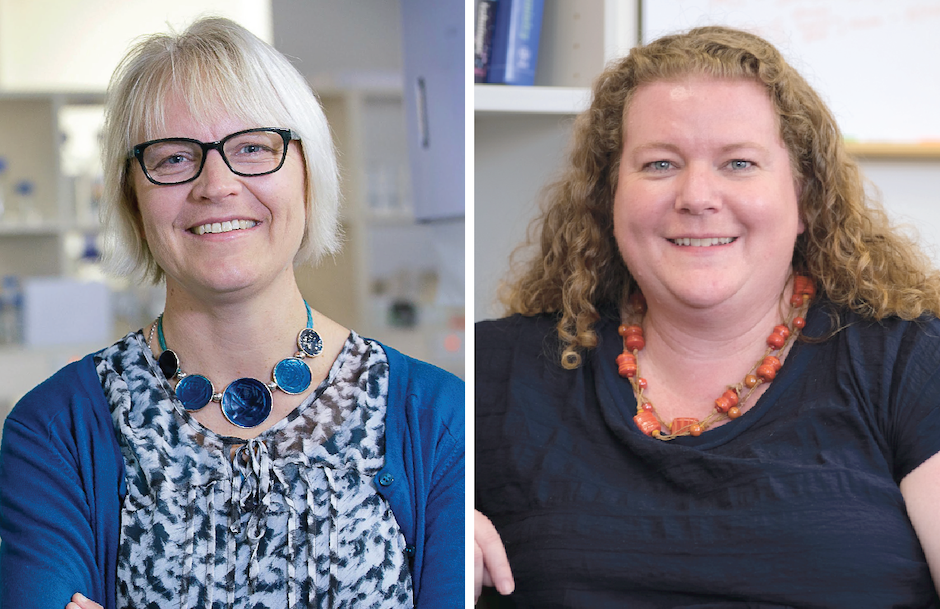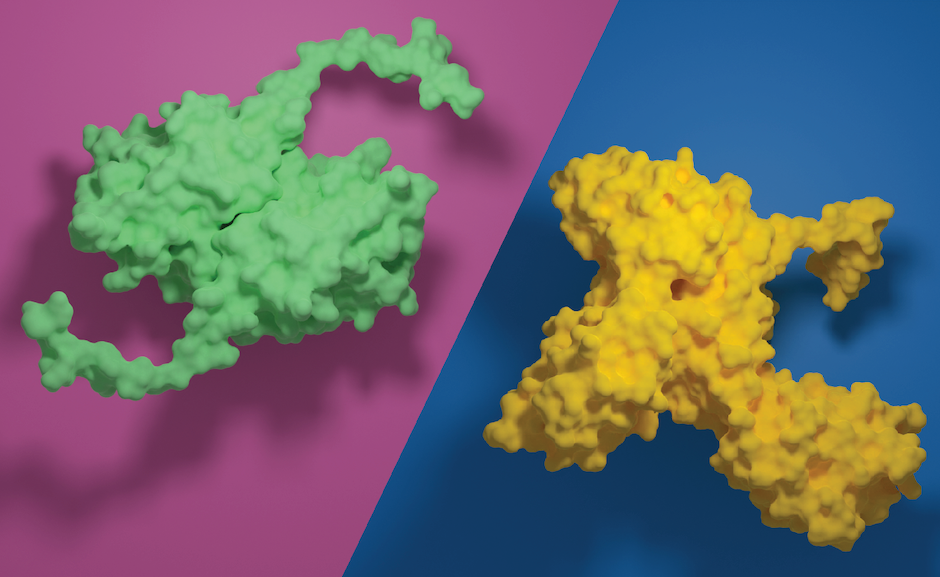
Department of Biochemistry Marsden Award recipients for 2023: Associate Professor Liz Ledgerwood (left) and Associate Professor Louise Bicknell (right).
Two research leaders based in the Department of Biochemistry have been awarded prestigious Marsden funding this year to explore unknown details of how our bodies work, in neural development and aerobic biology.
Associate Professors Liz Ledgerwood and Louise Bicknell both lead research groups that look ‘under the hood’ to understand how specific molecules in our cells work. Although they are both studying protein function, each group is focussed on very different areas of human biology, and use very different techniques in their research.
Louise’s group ‘harnesses the power of human genetics to uncover novel biology’. After looking at the genetics of patients that have a severe neurological disorder, they have discovered that a group of these patients all have mutations in a protein called ORC3. This protein is known to help in DNA replication, but they think that it may be playing another essential role in the development of neurons.
Along with associate investigators Professors Stephanie Hughes (Department of Biochemistry) and Julia Horsfield (Department of Pathology), Louise’s team will use this year’s Marsden award to figure out exactly what this protein does normally, and what goes wrong in neurons when it is mutated, using cells grown in the lab and zebrafish as a disease model.
Louise emphasises the contribution of patients to her research. “This project is very much curiosity-driven, informed by patients with uncharacterised rare disorders, so we are very appreciative to the international group of families for their involvement.”
Liz’s group studies peroxiredoxins, proteins that are able to sense and break down hydrogen peroxide in cells. Oxygen is both essential for our cells to live, and very damaging. Hydrogen peroxide is one of the toxins produced as a byproduct of using oxygen for respiration.
Peroxiredoxin proteins can protect cells against oxidative damage, and also regulate signals that are passed along inside cells.

The proteins at the centre of the Department of Biochemistry Marsden-funded projects, peroxiredoxin (left, green) and ORC3 (right, yellow). The image is made using experimental evidence for the shape of these molecules (PDB IDs 2RII and 7JPO).
Liz’s group have learned a lot about these proteins by isolating and studying them by themselves, but they really want to know how the proteins behave when they are still inside living cells.
The peroxiredoxins stick to themselves, forming large complexes made up of 10 copies of the protein, known as decamers. They would like to know exactly how these decamers affect the functions of the protein when they form inside a cell.
To help reveal exactly what the decamers are doing in our cells, Liz's team will use nanobodies (a type of antibody that originally came from camels and are now used as a tool to research molecules) and live-cell fluorescence fluctuation microscopy (a way of measuring protein movement and interactions). Ultimately, this will help us to understand more about how our biology deals with oxygen in our cells.
Associate investigators helping Liz with this research are: Associate Professor Peter Mace (Department of Biochemistry), Prof Mark Hampton (Department of Pathology and Biomedical Science on the University of Otago, Christchurch), and Associate Professor Elizabeth Hinde (Bio21 Institute, University of Melbourne).
Both Liz and Louise are very appreciative of the funding, not just for the molecular research that they will be doing with it, but also for the opportunities it provides for the staff and students in their research teams, and the ability to explore new research techniques.
“This funding is so valuable beyond the research objectives we will undertake, as it provides stability for the lab and allows us to continue some novel research avenues”, Louise comments.
You can learn more about Liz and Louise’s research on their profile pages: